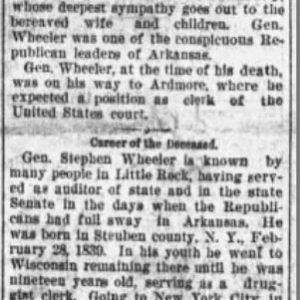calsfoundation@cals.org
Stephen Wheeler (1839–1897)
Stephen Wheeler was a veteran of the Civil War, a longtime court clerk for the Western District of Arkansas, an auditor for the State of Arkansas, a state senator, and the publisher of a journal.
Stephen Wheeler was born on February 28, 1839, in Steuben County, New York. His mother, Millicent Clark Wheeler, died when he was nine years old, at which time his father, farmer Daniel Wheeler, moved to Wisconsin. Stephen Wheeler began a three-year apprenticeship with a druggist when he was sixteen. He later moved back to New York and became a salesman at a dry goods wholesale warehouse. He later moved to Michigan, and in 1861, he volunteered in the Union army and enlisted at Battle Creek, Michigan.
During the Civil War, Wheeler gradually rose through the ranks from private to sergeant to first lieutenant and finally to captain. He served in three branches of the army, including engineers, infantry, and cavalry, and he participated in battles at Pea Ridge and Prairie Grove in Arkansas and Newtonia in Missouri. His last assignment was when he served on the staff of General Charles Morgan, as assistant adjutant general and then as a captain. Wheeler was discharged from the Union Army in April 1866, and after his discharge, he settled in Powhatan (Lawrence County).
While at Powhatan, he was appointed assistant assessor of internal revenue and later was named assessor and collector. He kept that title when he moved from Powhatan to Searcy (White County). In 1868, during a trip from Searcy to Little Rock (Pulaski County), he was accosted by two men who jumped in front of his horse-drawn buggy brandishing revolvers. Wheeler jumped from his buggy just as the two men began firing. One bullet tore through his arm, but he managed to escape and eventually recovered from his wounds. (The incident was later believed connected to the August 1868 murder of Ban Humphries and Albert H. Parker.)
Wheeler served for a short time as an Arkansas state senator, being elected as a Republican in 1868 but resigning in June 1869. After his resignation, he moved to DeValls Bluff (Prairie County), where he was the managing editor of the White River Journal, a Republican publication in the First Congressional District. Soon after his resignation as a state senator, Wheeler was appointed quartermaster general of militia, with the rank of brigadier general. He held this post from July 1869 until January 1, 1873. He retained the title of general for the rest of his life; regardless of any other official positions he later held, his friends and colleagues always referred to him as General Wheeler.
Wheeler, a Republican, was elected state auditor, and served from January 6, 1873, to November 12, 1874. Wheeler did not run for auditor in 1874; in fact, no Republican ran for any state constitutional office that year. The disenfranchisement of Arkansas’s Democrats had ended, and the ballot for 1874 consisted only of Democrats for state constitutional offices.
After leaving the office of state auditor, Wheeler moved to Fort Smith (Sebastian County) in the spring of 1875 and was appointed clerk of the United States District Court for the Western District of Arkansas. Wheeler was also appointed clerk for the Federal Circuit Court for the Eighth Judicial Circuit.
When Wheeler was clerk of the Federal Court of the Western District, he was, in reality, the clerk for Judge Isaac Parker’s court. Judge Parker, known as the “Hanging Judge,” tried his first case in that court on May 10, 1875, and died on November 17, 1896; he did not hear any cases after August 1896 due to severe illness. Wheeler was Judge Parker’s clerk for his entire time on the bench. After Parker’s death, Wheeler continued to serve until June 4, 1897. He had served for twenty-two years as the clerk for the Western District of Arkansas and was replaced by his assistant, General H. B. Armistead. While in Fort Smith, he helped to organize the Grand Army of the Republic in Arkansas.
In search of a job, Wheeler boarded a train that was destined for Ardmore, Indian Territory (present-day Oklahoma). On the way to Ardmore, the train stopped in Gainesville, Texas, on August 20, 1897, and the passengers had an opportunity to rest and to buy something to eat. Wheeler was in the process of purchasing a lunch of tamales and wienerwurst when the train began to move. He tried to board the train while it was moving, and although he grabbed a handle of one of the passenger cars, his feet slipped from the steps and he fell under the wheels.
According to the Arkansas Gazette—under the headline “HIS HEAD SEVERED: Gen. Stephen Wheeler’s Horrible Death in Texas”—“His head was crushed into a shapeless mass and severed from the body. As he fell he gave a cry of despair and in a second was lifeless. Gen. Wheeler was well known in Gainesville and the remains were taken in charge by local Knights Templar, after being viewed by the coroner, and taken to an undertaker’s establishment.” Wheeler was an Episcopalian and a Mason, and he was buried with Masonic honors.
Wheeler is buried in Forest Park Cemetery in Fort Smith. His wife, Mary K. Love Wheeler, and two daughters survived him.
For additional information:
Harman, S. W. Hell on the Border: He Hanged Eighty-Eight Men. Fort Smith, AR: Phoenix Publishing Company, 1898.
“His Head Severed.” Arkansas Gazette, August 22, 1897, p. 1A.
Stephen Wheeler Collection. University of Central Arkansas Archives and Special Collections, Conway, Arkansas. Finding aid online at https://uca.edu/archives/m88-10-stephen-wheeler-collection/ (accessed November 10, 2021).
Jimmy Bryant
University of Central Arkansas
Staff of the CALS Encyclopedia of Arkansas







Comments
No comments on this entry yet.